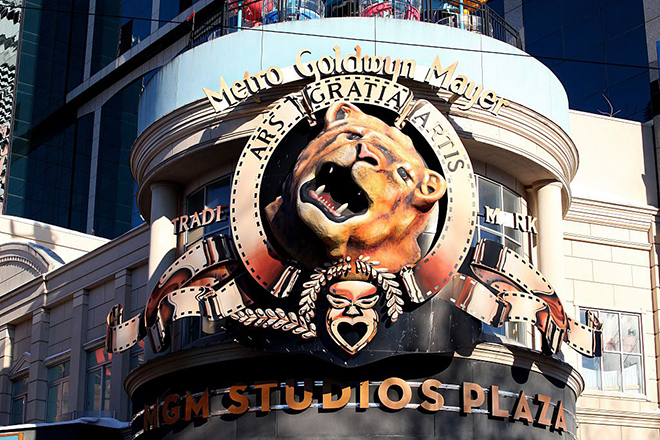S&P Global Offerings
Featured Topics
Featured Products
Events
S&P Global Offerings
Featured Topics
Featured Products
Events
S&P Global Offerings
Featured Topics
Featured Products
Events
Banking & Capital Markets
Economy & Finance
Energy Transition & Sustainability
Technology & Innovation
Podcasts & Newsletters
Banking & Capital Markets
Economy & Finance
Energy Transition & Sustainability
Technology & Innovation
Podcasts & Newsletters
S&P Global Offerings
Featured Topics
Featured Products
Events
27 May, 2021
 Amazon is hoping to buy MGM Holdings for $8.45 billion. But antitrust groups are already calling on the Biden administration to block the deal. Source: Raymond Boyd/Contributor via Getty Images |
Consolidation continues to stir through the media industry, leaving behind a soup of content companies that look much different than the individual studios, media and tech companies that were once on the shelf.
Most recently, Amazon.com Inc. said it will acquire MGM Holdings Inc., operator of the Metro-Goldwyn-Mayer Inc. film and TV studio, in a hefty $8.45 billion deal. While the pricey acquisition does pull more content studios under the umbrella of horizontally integrated tech and media companies, industry experts are divided on whether the deal does enough to impede competition so as to hit a regulatory roadblock.
"I don’t think that the MGM deal has much bearing on the other monopolistic concerns people may have about Amazon. They're already making TV shows and movies. This is just giving them more content to add to their library," said Wade Holden, an analyst with Kagan, a media research group within S&P Global Market Intelligence.
However, the current regulatory climate is not particularly friendly to big-tech consolidators or Amazon specifically. As Holden concluded, "That said, some people really don't like Amazon."
Already, the deal is rallying antitrust groups who worry about the potential impact on the film and TV business. Barry Lynn, executive director of Open Markets Institute, issued a statement saying U.S. President Joe Biden "must block Amazon's monopolistic ploy to take over MGM."
The Open Markets Institute is a nonprofit that aims to educate people about the dangers of monopolization, specifically in the technology industry.
"The takeover of MGM is a dangerous horizontal consolidation of two studios in an already highly consolidated business. And it is a vertical consolidation of power between one of the primary platforms for the sale and distribution of movies and one of the studios that creates movies," Lynn said in a statement.
Lynn also said that the deal would be bad for creative workers in the TV and film business, limiting a competitive employer marketplace. Diana Moss, president of the American Antitrust Institute, held similar reservations. The transaction would create a monopsony in the content business, or a market lopsided by the power of a single buyer, Moss said in an interview.
"Writers have been pummeled with consolidation in media/content for years. That has potential effects on maintaining diversity, quality, and innovation in content and deserves a close look in an antitrust review," Moss said.
However, by other accounts, the explosion of content and content platforms increased demand and salaries for many writers and other talent. Major companies with big budgets are backing platforms like Netflix Inc., The Walt Disney Co.'s Disney+ and Hulu, AT&T Inc.'s HBO Max, as well as advertising-supported video services like ViacomCBS Inc.'s Pluto TV and Fox Corp.'s Tubi TV.
Under this view, Amazon's deal for MGM is just one more step in a highly competitive race that has expanded, not restricted, the scope and diversity of content and the demand for content creators.
"There are plenty of outlets for creatives to exhibit their talents," independent film producer and content investor Justin Begnaud said in an interview.
Begnaud pointed to rapidly increasing content budgets swelling on every horizon. Amazon, Netflix, Hulu and Disney+ combined spent about $23.5 billion on content in 2020, according to Kagan estimates, including a rapidly swelling percentage of budgets dedicated to new original programming. Other deep-pocketed firms investing in originals and vying for a share in the streaming space include Apple Inc., Roku Inc., ViacomCBS, AT&T, Discovery Inc. and others.
Kagan counts well over 100 over-the-top aggregators in the U.S. alone, ranging from the British-focused Acorn TV to Indian film streamer YuppFlix.
Begnaud said he only sees the opportunities expanding, despite deals like Amazon's MGM purchase. Specifically, he believes that Verizon Communications Inc. and T-Mobile US Inc. will jump in to remain competitive with AT&T and harness the growth in mobile video content.
"Amazon-MGM makes a lot of sense and should pass government regulations," the producer said. MGM is not the Big Five studio it once was, leaning heavily on the James Bond franchise and a handful of TV properties, Begnaud said.
But as Kagan analyst Holden pointed out, many regulators are not very pleased with consolidation among tech conglomerates, and lawmakers are proposing bills that would impede their dealmaking. For example, U.S. Sens. Elizabeth Warren, D-Mass., and Josh Hawley, R-Mo., have each sponsored separate bills that would significantly limit M&A activity among large technology companies.
And with Discovery set to combine with WarnerMedia, regulators will have plenty of opportunities to consider the future of the business in coming days, Moss at the American Antitrust Institute said.
"Antitrust enforcers could ... be evaluating two major deals at the same time. That means they will need to consider multiple changes in the structure of the relevant content markets, however those are defined," Moss said.

